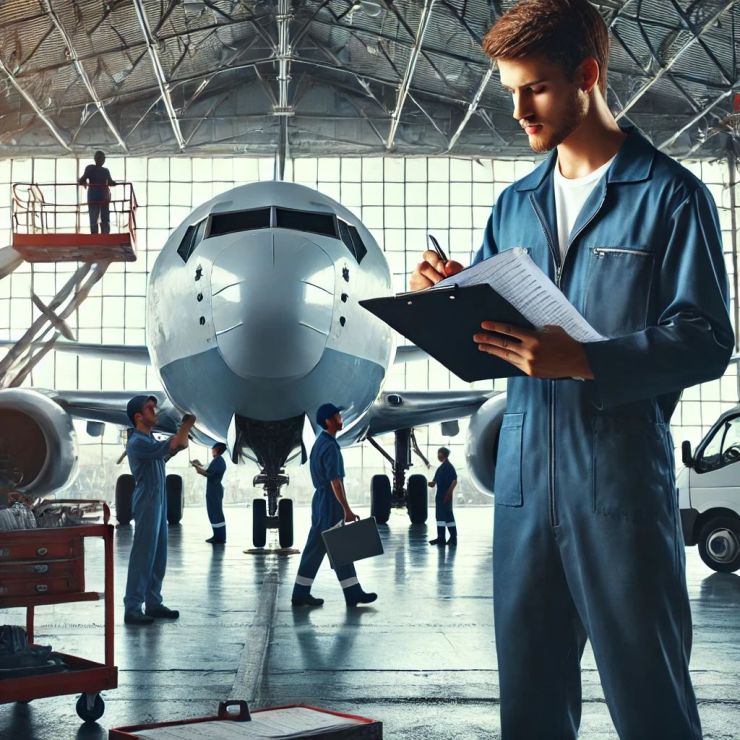What Does an Aviation Auditor Do?
10/08/24 02:58:pm
Aviation auditors play a critical role in ensuring the safety, compliance, and efficiency of aviation operations.
Their primary responsibility is to assess the safety management systems, operational practices, and regulatory compliance of aviation organisations. Whether working internally within an airline or externally as third-party inspectors, aviation auditors provide an objective analysis that helps mitigate risks, enhance operational standards, and foster continuous improvement.
This blog post explores the core functions and responsibilities of an aviation auditor, the types of audits they conduct, and their significance in the modern aviation industry.
Core Responsibilities of an Aviation Auditor
- Conducting Compliance Audits
At the heart of an aviation auditor’s role is ensuring that an aviation organisation adheres to national and international regulations. This includes compliance with standards set by bodies such as the International Civil Aviation Organization (ICAO), the European Union Aviation Safety Agency (EASA), or the Federal Aviation Administration (FAA). Auditors evaluate whether the organisation’s operations, aircraft maintenance programs, safety systems, and training programs meet the required regulatory standards.
- Assessing Safety Management Systems (SMS)
Auditors review the effectiveness of an organisation’s Safety Management System, a critical component in identifying, mitigating, and managing safety risks. Through detailed analysis of an SMS, auditors ensure that there is a proactive safety culture in place, including hazard identification, risk assessments, and the implementation of corrective actions.
- Operational Audits
In addition to compliance and safety audits, aviation auditors often conduct operational audits to review the organisation’s day-to-day practices. This includes reviewing flight operations, ground handling procedures, maintenance schedules, and the performance of personnel in key operational roles. By observing these activities, auditors assess whether the organisation is not only compliant but also operationally efficient.
- Review of Maintenance and Engineering Practices
Maintenance and engineering audits are critical to ensuring the airworthiness of aircraft. Auditors inspect the organisation’s maintenance records, practices, and adherence to scheduled maintenance intervals. They also examine the quality of work performed by maintenance personnel, including how well they follow documented procedures and whether they use approved tools and parts.
- Internal Audits and Continuous Improvement
Some aviation auditors are employed internally within airlines or other aviation organisations. In this capacity, their goal is to drive continuous improvement by regularly assessing the organisation’s internal processes. These audits help to identify potential issues before they become regulatory violations or safety hazards, providing an opportunity to address gaps in training, process inefficiencies, or lapses in safety protocols.
- Investigating Incidents and Accidents
In cases where an incident or accident has occurred, aviation auditors may be called upon to conduct a thorough review. This includes investigating whether there were any non-compliance issues, procedural failures, or SMS inadequacies that may have contributed to the event. Their findings often lead to recommendations for safety improvements and policy changes to prevent recurrence.
Types of Audits
Aviaton audits can be categorised into several types, depending on the focus of the audit:
- Regulatory Compliance Audits: Focused on ensuring adherence to governmental or international regulations.
- Operational Audits: These examine the efficiency and effectiveness of operational processes.
- Safety Audits: Concentrated on reviewing the robustness of safety systems and protocols.
- Financial Audits: Although not as common in an aviation-specific context, these audits assess financial integrity and adherence to budgetary guidelines within an aviation organisation.
The Importance of Aviation Auditors
In an industry as complex and high stakes as aviation, the role of auditors cannot be overstated. They act as the gatekeepers of safety and operational integrity, ensuring that airlines, maintenance organisations, and other aviation entities operate at the highest standards. Through detailed assessments, aviation auditors help organisations identify weaknesses, manage risks, and foster a culture of continuous improvement.
Moreover, in the context of evolving regulations and emerging technologies, such as unmanned aircraft systems (UAS) and electric vertical take-off and landing (eVTOL) aircraft, aviation auditors must remain up to date with regulatory changes and industry trends. Their expertise allows them to adapt audit practices to new types of aviation operations, ensuring that the industry's rapid advancements are accompanied by robust safety and compliance practices.
An aviation auditor plays an indispensable role in maintaining the safety, efficiency, and compliance of aviation organisations. Through their meticulous reviews of operational processes, safety systems, and regulatory adherence, auditors provide valuable insights that help aviation professionals maintain high standards and mitigate risks. In an industry where safety is paramount, the work of an aviation auditor contributes significantly to safeguarding lives and enhancing the reliability of air transport globally.

Latest News
Projects
- ZS-NRM Accident Analysis
- UKCAA CAP437 Update
- CAP437 Inspections & Friction Tests
- Aviation Risk in Numbers
- Integrated Safety/Quality Course
- Friction Testing of Helidecks
- AIIA Course
- Amy Johnson - Pioneering Aviator
- Safety First!
- Risk Management in Aviation
- OMWIT Training
- eVTOL
- CASA (VDOTWG)
- Independent Aviation Auditing
- Converting Helipads to Vertiports
- Next HIAT Course
- The Flight Safety Group
- Emerging Trends in Auditing
- Night VFR
- Top 5 Safety Measures
- The Role of Auditing
- Emergency Response
- Flight Safety Group
- Single Pilot Ops
- Safety Culture
- Helideck Obstructions
- CASA Part 133
- World's First Flying Car
- Vertiport Safety Training Course
- Humanoid Robot Pilot
- The Benefits of Using Drones
- What Does an Aviation Auditor Do?
- What Are the Main Components of an Aviation Safety Audit?


